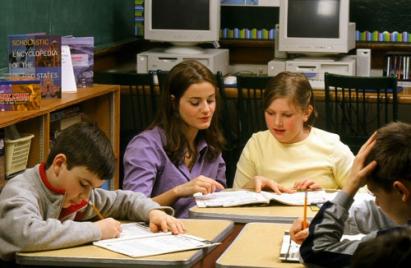Accreditation Process

Following our accreditation in Spring 2020, we are continuing to work with the Council for the Assessment of Educator Preparation (CAEP). Their strategic goals are:
- To raise the bar in educator preparation
- To promote continuous improvement
- To advance research and innovation
- To increase accreditation's value
- To be a model accrediting body
- To be a model learning organization
SUNY Geneseo's School of Education is well known for its rigor in teacher education. We are committed to recognizing and nurturing excellence among our teacher candidates and practicing teachers. Our vision reflects this focus - “The Ella Cline Shear School of Education is a community of learners dedicated to the development of socially responsible educators who advocate for the profession and for all students. We provide a deep and thoughtful preparation in theory and pedagogy that embodies the principles and ideals of a liberal arts education. Our programs emphasize the tenets of diversity, inclusivity, global awareness, and innovation. We achieve this through collaboration and open, respectful communication among students, staff, and faculty, as well as through sustained partnerships with communities, agencies, and schools.” As part of the CAEP process, each certification offered within the School of Education submits reports to their Specialty Professional Association (SPA) which includes measures of candidate performance throughout the program which are aligned with their program standards, New York Learning Standards, Interstate Teacher Assessment and Support Consortium (inTASC) Standards, and the National Board for Professional Teaching Standards (NBPTS). Each individual SPA focuses on measures of candidate success in the following areas:
- Content Knowledge as measured by performance within the program as well as New York State Certification Exams (NYSTCE)
- Ability to Plan for Instruction as measured by key assessments within the program
- Successful Completion of Student Teaching as measured by observation records and evaluations by cooperating teachers and clinical supervisors
- Ability to Impact Student Learning as measured by assessments during practicum and student teaching, and the NYS EdTPA certification exam
*each SPA requires 6-8 measures of candidate progress

An exit survey is administered each year to our graduates and an alumni and employer survey is sent out every three years followed by analysis and appropriate action steps within the School of Education.
CAEP Accountability Measures
CAEP Standard 4.2 is about Accountability Measures. We are asked to measure the following and report them publicly:
- Measure 1 (Initial): Completer effectiveness. (R4.1) Data must address: (a) completer impact in contributing to P-12 student-learning growth AND (b) completer effectiveness in applying professional knowledge, skills, and dispositions.
- Case Study
- Focus Groups
- P-12 Surveys
- Alumni/employer surveys
- Measure 2 (Initial and Advanced): Satisfaction of employers and stakeholder involvement. (R4.2|R5.3| RA4.1) Data provided should be collected on employers' satisfaction with program completers.
- Employer Survey and Focus Group
- Meetings and Partnerships with P-12 School Partners
- Measure 3 (Initial and Advanced): Candidate competency at completion. (R3.3) Data provided should relate to measures the EPP is using to determine if candidates are meeting program expectations and ready to be recommended for licensure. (E.g.: EPP's Title II report, data that reflect the ability of EPP candidates to meet licensing and state requirements or other measures the EPP uses to determine candidate competency at completion.)
- Title II Report
- NYSTCE Scores
- Measure 4 (Initial and Advanced): Ability of completers to be hired (in positions for which they have prepared.)
- Alumni and Employer Surveys (listed within Measures 1 & 2)